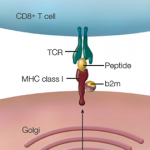Study Highlights
As mentioned above, the study looked at two main issues to understand the role of gut microbiota in the pathogenesis of reactive arthritis. The first issue was to characterize the types of bacteria present in the gut of patients who develop reactive arthritis/postinfectious spondyloarthritis compared with controls who were exposed to the same types of infections but did not develop disease. The second issue was to characterize the relationship of host genes to microbiota.

Dr. Manasson
To do this, Dr. Manasson and colleagues focused on 64 adult subjects who all had a previous GI or GU infection. Of these, 32 subjects subsequently developed reactive arthritis/postinfectious spondyloarthritis and 32 did not. As mentioned previously, all participants were from Guatemala, a geographical region where HLA-B27 prevalence is low.
All participants were between the ages of 18 and 55 years old and had experienced a GI, GU or sexually transmitted infection three to six months prior to study enrollment. Patients were excluded from the study if they were diagnosed with inflammatory bowel disease, psoriasis, other inflammatory arthritis or autoimmune disease, or active cancer.
Each participant underwent a clinical examination that included a history and physical examination, as well as ultrasound. Data collected included HLA typing and stool for microbiota analysis.
The study found that gut microbial richness and diversity were similar between both groups of patients, but that participants with reactive arthritis had significantly greater abundance of enteropathogens than controls. Specifically, the study found a significantly higher abundance of bacteria from the genus Erwinia, which is commonly linked to more than 97% of the gut bacteria, associated with reactive arthritis. These bacteria include Salmonella, Shigella and Yersinia. The study also found a higher abundance of the pathogen Pseudomonas in the participants who developed reactive arthritis than in controls.

Dr. Steere
In addition, the study found several gut commensals were decreased in the patients with reactive arthritis compared with controls. Specifically, control subjects were enriched in the Lachnospiraceae taxa, including Blautia, Coprococcus, Roseburia and Collinsella.
“Our study showed that the abundance of enteropathogens was increased and the abundance of commensal organisms was decreased in subjects who developed reactive arthritis/postinfectious spondyloarthritis compared to those who did not,” says Dr. Manasson, “which may suggest a susceptibility to disease development.”
Overall, Dr. Manasson says the study showed host genes were associated with particular microbial signatures and that differences in microbiota composition were found between patients who developed reactive arthritis and controls. “We believe that genes may predispose individuals to certain gut microbial signatures, which, in the right setting, may make individuals more or less susceptible to disease after GU or GI infections,” she says.



